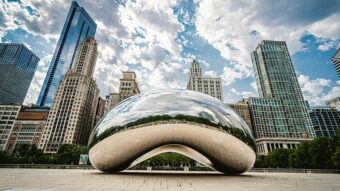Denise Drach sees it often: Visitors come to Detroit for the first time and are amazed by the city’s architecture, beauty and cultural attractions.
And now? A whole crop of first-time visitors will descend upon Detroit for the Urban Land Institute’s Spring Meeting, being held May 1 -3 in the city’s Cobo Center.
For Drach, director of business development with Detroit-based architecture and interior-design firm Rossetti, the conference is a chance to show off the progress Detroit has made since filing for Chapter 9 bankruptcy protection in 2013.
And the fact that the Urban Land Institute chose Detroit as the home for its spring conference? Drach says it’s more evidence that the news of Detroit’s recovery is spreading across the country.
“We are thrilled that the conference is being held here,” Drach said. “People want to come to Detroit. They are interested in the city. They’ve heard the buzz. They are starting to believe in it. They not only want to hear about the success stories, th ey want to see it for themselves. The story of Detroit’s reinvention has caught on nationwide. People want to come live it and see it for themselves.”
The Spring Meeting is a big deal, and it will kick off May 1 with tours of Detroit’s newest real estate projects. This is a way for Detroit’s commercial real estate leaders to showcase the city and the progress it’s made.
Mark LoPatin, president of Farmington Hills, Michigan-based developer LoPatin & Co., said that the Urban Land Institute’s return to Detroit is long overdue. It has been 40 years since the last time the institute held a national event in the city.
“That tells you a little bit about what unfortunately happened to Detroit and what is happening now,” LoPatin said. “It’s quite an honor for the Urban Land Institute to come here.”
The Spring Meeting is an important event for LoPatin. He grew up in Detroit. He saw the city fall into decline. And now he sees the potential of this key Midwest city.
“We now see the opportunity for Detroit again to be one of the great cities in the country,” LoPatin said. “We are very proud that the Urban Land Institute is bringing international leaders in land use to see and hopefully invest in this renaissance.”
That last point is important. Yes, it’s a positive sign that the institute is hosting its meeting here. But the greater benefit would be if attendees plant the seeds of future deals in Detroit and its surrounding communities.
Drach says that she expects this to happen, especially after attendees see the commercial activity already taking place in the center of Detroit.
“People will see how much opportunity there is,” Drach said. “There are collaborations that can be forged. If people have the will and the interest, deals can be made.”
What’s changed in Detroit? Both LoPatin and Drach point to the city’s new administration. As Drach says, the government is now pro-business and is working with those who want to invest in Detroit. That wasn’t always the case here.
It’s not just the big deals that grab the headlines that are making a difference in Detroit, either. LoPatin says that when a single investor buys a residential house in Detroit, fixes it up and then resells it? That, too, is making a positive impact in the city.
“It doesn’t matter what development we are talking about, I’m excited about it,” LoPatin said. “Anything that helps turn a neighborhood around? That has me excited.”



